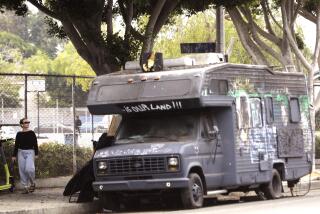Traveling Peddlers: Freedom, Modest Dreams : Thousands take to the road seasonally, convinced that everyone can afford a bargain.
- Share via
FT. MYERS, Fla. — Sometime next month, Walt and Sandy Lamkin will hit the road again, fleeing Florida’s summer with their trailer full of wares for the fairgrounds and festivals of New England--and the hope of bigger crowds, more money and a little middle-age security.
They’ll head north in their live-in van, the dog, Brandy, stretched out by the stove and the Amazon parrot, Envy, perched on a bunk bed, offering an acceptable version of “Zip-a-dee Doo-Dah.” The trailer they tow will be so jammed with goods--everything from contour pillows to jewelry to disposable rain jackets (two for $1)--that Lamkin will have to shoulder the door to secure the lock.
In another life, the Lamkins were worth several million dollars. Then in the early ‘80s, the bottom fell out of the egg-and-poultry business in Maine and they lost their 1,500-acre farm. They moved to Florida to start over--after a couple of false starts--as members of the growing class of entrepreneurs who peddle wares from town to town and consider storefronts, leases and 800-phone numbers an unseemly symbol of settlement.
From California to Florida, thousands of Americans are on the road like the Lamkins these days, moving with the seasons, plying their trade at flea markets and trade shows. They may sell fine silverware or antiques, T-shirts or gadgets that slice, dice and cut in a single swipe. But each is united by his or her disdain of having to punch a time clock or answer to a boss.
Like the drummers of the Old West--the salesmen who traveled from town to town, hawking medicines and housewares from the backs of their wagons--today’s itinerant vendors play to the most basic American instinct: Every home can afford a bargain. They are survivors, possessed of modest dreams, content to pursue a decent living and the freedom to move on when business is lean.
By 7:30 a.m. the other Friday, the Lamkins had set up four tables in the space they rent for $60 a weekend at Fleamaster’s flea market in Ft. Myers. The covered, open-air market --one of more than 150 that operate year-round in Florida--attracts 800 vendors and 30,000 customers on a busy weekend.
“I don’t care what I sell,” said Walt Lamkin, 54. “All I want is a good product that no one else has. That’s the magic, finding the product. . . .
“Battery-operated talking parrots are big this year, and I never would have guessed that. Take the nice cooler with a two-quart jug I found. I said everybody’s going to want that. I bought 72 of them for $8 each. I marked them up to $14.95. They didn’t sell and I kept dropping the price because you can’t let your money sit around. I just sold the last one the other day, for $5.”
The early crowds were sparse on this morning. The sellers were middle-aged and many had come to this line of work because they had failed at some earlier business or had retired and didn’t want to be idle. With Florida emptying as summer approached, most had plotted their escape to points north and west.
“Eight years ago, I came down to Florida as a commercial fisherman,” said George Nichol, standing among tables stocked with jellies, greeting cards, cotton ear swabs, chamois clothes, men’s dress belts, billy clubs and rolls of rope. “It was a lot of work for no money. Pulling 70-pound traps of stone crabs 300 times a day, out from dawn to dusk, getting eaten by a brutal sun--that’s a job for young people, and I was lucky enough to realize it. You got to have a lot of luck to be old these days.”
Nearby, Norm and Cathy Bricker had parked the 40-foot motor home they live in next to their Rising Sun Traders jewelry counter. Their 11-year-old son, Aaron, whose schooling is done by correspondence courses, was organizing the baseball cards that he will sell and swap when the family leaves for Arizona, California, Alaska and Montana.
“When Norm wanted to sell off the farm and go on the road . . . about 10 years ago, I was dead set against it,” Cathy Bricker said. “But now I wouldn’t be caught dead living in the same place. I feel antsy just visiting my parents in Maryland.”
After the Lamkins lost their Maine farm in 1982 and their Florida tire shop to fire in 1990, their net worth was down to $500. They bought $300 worth of canned food, figuring that would sustain them for a couple of months, and spent the final $200 on cashews and pecans. They sold them at a flea market and have been among the modern-day drummers ever since.
“I tried to get a regular job,” Walt said, “but hell, I was 50 years old with a degree in agriculture. No one was going to hire me. So you do what you got to do to survive. Actually, I’ve got no complaints. The egg business was good to me for 20 years. We raised two boys we’re proud of. We’re paying our bills now. Hell, I’m as happy as if I had brains.”
By the time the flea market closed, the Lamkins’ receipts totaled $205, less than half what they had taken in the previous Friday. “That’s why it’s time to get out of Florida,” Walt mumbled. “You can’t live on that.”
More to Read
Sign up for The Wild
We’ll help you find the best places to hike, bike and run, as well as the perfect silent spots for meditation and yoga.
You may occasionally receive promotional content from the Los Angeles Times.






